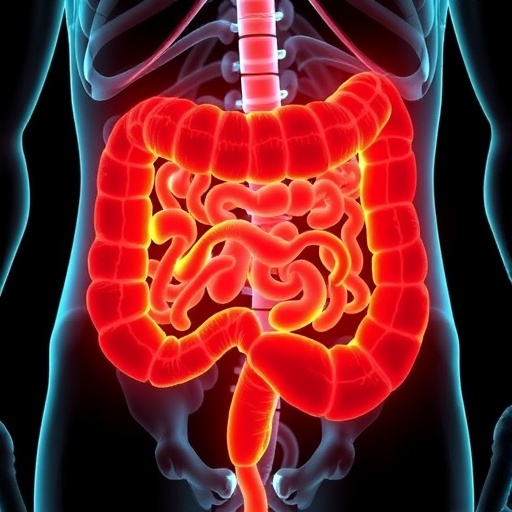
A groundbreaking study recently unveiled by Liu and colleagues sheds new light on the complex mechanisms underlying intestinal mucosal integrity, specifically highlighting the protective role of peptide YY (PYY) in conditions aggravated by SATB2 deficiency, a key factor implicated in inflammatory bowel disease (IBD). This pivotal research, published in Cell Death Discovery, not only advances our understanding of IBD pathophysiology but also opens promising avenues for therapeutic interventions in a disease that impacts millions worldwide.
Inflammatory bowel disease, encompassing Crohn’s disease and ulcerative colitis, is characterized by chronic inflammation of the gastrointestinal tract, leading to severe mucosal damage, impaired barrier function, and persistent symptoms that drastically reduce quality of life. Despite extensive research, effective treatments that restore mucosal integrity remain limited. The study by Liu et al. addresses this crucial gap by exploring how deficiencies in the SATB2 protein exacerbate mucosal defects and how PYY, a gut hormone traditionally linked to appetite regulation, emerges as a potential protective agent.
SATB2 (Special AT-rich Sequence-Binding Protein 2) functions as a chromatin organizer and transcriptional regulator integral to maintaining mucosal homeostasis. Previous studies identified SATB2 as pivotal in epithelial cell differentiation and barrier maintenance; however, its role in IBD-associated mucosal injury was not fully elucidated. Liu’s team discovered that SATB2 deficiency leads to compromised epithelial structure, increased permeability, and amplified inflammatory responses, creating a vulnerable mucosal environment prone to damage.
Crucially, the research identifies PYY as a compensatory mechanism activated in response to SATB2 loss. Known primarily for its role in satiety and gut motility, PYY’s function within intestinal mucosal repair was previously underappreciated. Through a series of in vivo and in vitro experiments, the authors demonstrated that PYY exerts anti-inflammatory effects and promotes epithelial regeneration by modulating key signaling pathways, including those regulating cell proliferation and apoptosis.
Advanced molecular analyses revealed that PYY administration restored mucosal barrier integrity by enhancing tight junction protein expression, thereby reducing epithelial permeability. Moreover, PYY appeared to mitigate oxidative stress and suppress pro-inflammatory cytokine production, which are hallmarks of IBD pathology. These findings position PYY as a multifaceted mediator that perpetuates mucosal healing and immune modulation in the context of SATB2 deficiency.
The experimental design employed genetically engineered mice models with targeted deletions of SATB2, providing a robust platform to assess pathological changes and treatment responses. Treatment groups receiving exogenous PYY showcased remarkable recovery from mucosal defects compared to controls, emphasizing the hormone’s restorative potential. Complementary cell culture studies corroborated these findings, elucidating the cellular mechanisms underpinning PYY’s protective effects.
This study’s implications extend beyond theoretical insights, suggesting tangible clinical applications. Given that existing IBD therapies often focus on general immunosuppression, introducing treatments aimed at enhancing intrinsic mucosal repair mechanisms represents a paradigm shift. PYY or PYY analogues could be developed into novel therapeutics aimed at fortifying the gut barrier and ameliorating inflammation in patients with SATB2-related mucosal impairment.
Furthermore, Liu and colleagues explored the interaction between PYY signaling and the microbiota, an emerging factor in IBD pathogenesis. Preliminary data suggest that PYY influences microbial composition, potentially fostering a more symbiotic gut environment conducive to mucosal healing. This intriguing possibility invites further investigation into gut hormone–microbiome crosstalk as a therapeutic target.
From a translational perspective, the use of biomarkers such as PYY levels could refine diagnostic approaches, enabling personalized treatment plans based on SATB2 status and mucosal integrity assessment. The precision medicine angle reinforced by this study offers hope for improved outcomes by targeting specific molecular deficits rather than applying broad-spectrum therapies.
The revelation that a hormone traditionally affiliated with energy homeostasis plays a vital role in intestinal mucosal defense underscores the dynamic multifunctionality of gut-derived peptides. As the gut is increasingly recognized as a neuroendocrine organ, this research highlights the interconnectedness of digestive physiology, immune regulation, and systemic health.
Future research directions emerging from this study include detailed exploration of PYY receptor subtypes involved in mucosal protection, optimization of dosing strategies for potential PYY-based treatments, and long-term safety evaluations. Additionally, identifying patients with SATB2 deficiencies could become integral to stratifying IBD populations for targeted interventions.
This landmark study not only expands the scientific community’s comprehension of IBD pathogenesis but also provides a beacon of hope for innovative therapies that harness endogenous protective mechanisms. The dual role of PYY as an appetite regulator and mucosal guardian reflects the complexity of gut physiology and encourages interdisciplinary collaboration in gastroenterology, immunology, and endocrinology.
As the field moves forward, integrating these new molecular insights into clinical practice could transform management strategies for millions suffering from debilitating intestinal disorders. The research by Liu et al. is a testament to the power of precision medicine and the ongoing quest to decipher the molecular intricacies of human health.
In conclusion, uncovering PYY’s protective role in counteracting the deleterious effects of SATB2 deficiency offers an exciting and promising frontier in IBD treatment strategies. This research paves the way for new therapeutic paradigms centered on enhancing endogenous healing pathways, marking a significant milestone in the battle against chronic intestinal inflammation.
Subject of Research: The protective role of peptide YY (PYY) in intestinal mucosal defects induced by SATB2 deficiency within the context of inflammatory bowel disease.
Article Title: The protective role of PYY in intestinal mucosal defects induced by SATB2 deficiency in inflammatory bowel disease.
Article References:
Liu, Y., Wu, L., Li, X. et al. The protective role of PYY in intestinal mucosal defects induced by SATB2 deficiency in inflammatory bowel disease. Cell Death Discov. 11, 227 (2025). https://doi.org/10.1038/s41420-025-02511-y
Image Credits: AI Generated
DOI: https://doi.org/10.1038/s41420-025-02511-y
Tags: advancements in IBD researchCell Death Discovery publication on IBDchronic inflammation and barrier dysfunctiongut hormone PYY functionsinflammatory bowel disease mechanismsmucosal damage in ulcerative colitismucosal integrity in Crohn’s diseasepeptide YY and gastrointestinal tractPYY protective role in IBDSATB2 and epithelial cell differentiationSATB2 deficiency and intestinal healththerapeutic interventions for IBD





